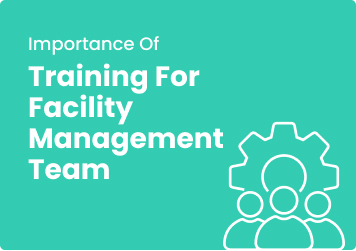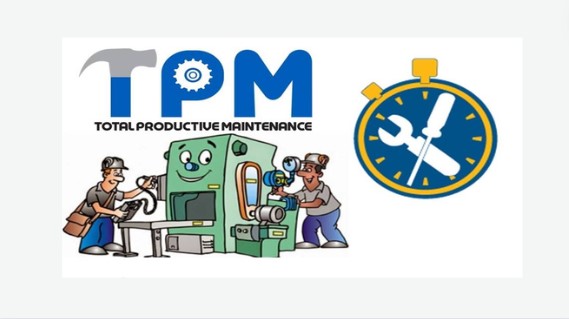
Importance of training for Facility Management team
Madhurima Sanyal |
24 May 2024 |
15:48 PM
- What is Facility Management ?
- Why Training is Crucial for Facility Management Teams
- Core Components of Facility Management Training
- Recommended facility management courses and seminars:
- Strategic and Operational Aspects of Facility Management Training.
- Roles and Responsibilities Of Trained Facility Management Teams.
- The Power of Targeted Training
- Software and Services For Effective Facility Management Training.
- Benefits of Integrating These Tools Into FM Training
- Introducing Proptor: Your All-in-One Operations Management Superhero
- Conclusion.

10 Benefits of Total Productive Maintenance
Pratik Lohiya 16 Mar 2024 | 17:18 PMUnlock the potential of Total Productive Maintenance (TPM) for enhanced efficiency and reliability with Proptor's CMMS software. Drive continuous improvement and perfect production while optimizing equipment availability with our comprehensive mainten...
Facility management (FM) keeps everything running smoothly. It's like the team working behind the scenes in a theater, ensuring everything goes well during a show.
Facility management (FM) is crucial because it helps in making sure buildings and spaces are used in the best possible way.
Today, FM is more important than ever in the busy world of business. FM boosts efficiency, productivity, and keeps everyone happy – from employees to customers. However,! To be excellent at this job, facility management teams need top-notch training.
Here are the 3 key reasons why training a Facility Manager is important:
- It makes operations run better
- It keeps everyone safe
- It helps protect the environment
This blog will explain why good training is essential for facility managers.. It's like giving them superpowers to boost operational effectiveness. Trained facility managers can cut down risks, and promote sustainability.
Training isn't about learning the ropes! But it is about arming them with the tools they need to conquer any challenge. So, get ready to uncover why training for facilities managers is the key to unlocking success.
What is Facility Management ?
Facility management is all about keeping the wheels turning smoothly in a business. It's like the conductor of an orchestra, ensuring every instrument plays in harmony.
Why is it important?
Facility management is the backbone of a successful business, ensuring that everything operates seamlessly. From keeping the lights on to maintaining optimal air conditioning, it plays a crucial role. Without effective facility management, a business could quickly descend into chaos.
Benefits of effective facility management:
- Cost efficiency: Effective facility management saves money. When things run smoothly and businesses find ways to spend less, they can make more money and work better.
- Safety enhancement: Safety is a top priority in any workplace. Facility management checks buildings to meet rules, fixes dangers, keeps everyone safe.
- Sustainability and compliance: In today's world, sustainability is key. Facility management helps businesses meet environmental regulations. It helps them reduce their carbon footprint. And it helps them operate in a socially responsible way.
- Operational continuity: When things go wrong, facility management will save the day. It handles everything from power outages to natural disasters. Effective facility management makes sure businesses keep running smoothly. No matter what challenges they face.
Why Training is Crucial for Facility Management Teams
Have you ever wondered why some facility management teams seem to ace their job than others? It all comes down to training.
Trained Facility Management Team Vs. Untrained Facility Management Teams
Trained facility management (FM) teams operate like a well-oiled machine. They know what they're doing, and they do it well.
On the flip side, untrained teams often find themselves fumbling in the dark. They are unsure of how to tackle challenges well. This gap in performance can make a world of difference in the smooth functioning of a business.
Specific benefits of training facility management
- Improved knowledge: Training equips FM teams with the skills to excel in their roles. Trained teams understand complex systems. They master new technologies. This makes them better equipped to handle anything.
- Better response to emergency situations: When emergencies strike, trained FM teams spring into action. They know exactly what to do, who to call, and how to mitigate risks. This efficient response can mean the difference between a minor hiccup and a full-blown crisis.
- Enhanced decision-making capabilities: Training sharpens decision-making skills for FM teams. It helps them make smart choices even under pressure. Whether it's allocating resources in tight budgets or prioritizing tasks in busy times. Trained teams can make informed decisions that help the whole business.
In summary, training is the key factor that makes the best facility management teams stand out. Investing in training prepares these teams to handle any problem. It helps them perform their tasks perfectly. Also, it allows them to help their organization succeed.
Core Components of Facility Management Training
Facility management training covers a wide range of topics to prepare teams for success. Here's a glimpse into some of the core components:
- Strategic planning and operational execution: This part of the training focuses on developing strategic thinking skills. Facility managers learn how to align FM objectives with overall business goals. They also delve into operational execution, understanding how to translate strategic plans into actionable steps.
- Sustainability practices: In today's environmentally conscious world, sustainability is a top priority. Training in this area equips FM teams with the knowledge and tools to implement sustainable practices. From energy conservation to waste management, trained managers can make a significant impact on the organization's environmental footprint.
- Compliance and safety protocols: Safety always comes first in facility management. Training ensures that FM teams are well-versed in compliance regulations and safety protocols. Whether it's fire safety procedures or building codes, trained managers know how to keep everyone safe and ensure regulatory compliance.
- Use of facility management tools and software: Technology plays a crucial role in modern facility management. Training covers the use of facility management tools and software to streamline operations. From maintenance scheduling software to space management tools, trained managers can leverage technology to enhance efficiency and productivity.
Recommended facility management courses and seminars:
For those looking to dive deeper into facility management, there are various courses and seminars available.
In Mumbai, for example, several institutions offer facility management courses tailored to meet the needs of aspiring FM professionals.
These courses cover a wide range of topics, from fundamentals to advanced strategies, providing participants with the skills and knowledge needed to excel in the field.
Strategic and Operational Aspects of Facility Management Training.
Aligning facility management (FM) training with company goals makes a big difference. FM teams understand the big picture and their role in it. This helps them make smarter decisions and manage tasks better.
Training gives them skills for smoother operations and faster problem-solving. They can also allocate resources more easily.
Investing in FM training means investing in success. It improves both individual team members and the whole company. In today's competitive world, this is the key to doing well.
Roles and Responsibilities Of Trained Facility Management Teams.
The Facility Manager
The Facility Manager acts as the mastermind, overseeing strategic planning and execution. They ensure that the facility management team's goals are aligned with organization's goals.
The Operations Manager
The Operations Manager is the on-the-ground conductor, ensuring all day-to-day tasks run efficiently. They keep a watchful eye on deadlines and budgets. They make sure everything gets done on time and within financial constraints.
Maintenance Technicians
The backbone of the team, Maintenance Technicians are the hands-on heroes. They tackle essential tasks like repairs. They keep the facility running like clockwork.
The Power of Targeted Training
Targeted training empowers each team member to excel in their role. It equips Maintenance Technicians with the skills to make critical decisions. Additionally, training ensures everyone adheres to the latest safety protocols, minimizing risks and keeping everyone safe.
Investing in a well-trained facility management team leads to operational excellence, paving the path for organizational success.
Software and Services For Effective Facility Management Training.
Facility management training has gone digital, and it's a game-changer! Let's explore the awesome tech and services making FM training cooler than ever.
- Core Facility Management Software: It's like having a superhero assistant! This software keeps everything organized, from maintenance schedules to equipment tracking. It's the key to smooth operations.
- People, Places, and Processes Framework: Everything's connected! These frameworks show how people, space, and processes all work together. By optimizing them, FM teams create a better workplace for everyone.
- External Services like Compass Facility Services: Sometimes you need backup. These services handle tasks like maintenance and security, so your team can focus on the big picture.
Benefits of Integrating These Tools Into FM Training
- Efficiency Ninjas: Streamlined processes save time for strategic projects.
- High Five for Teamwork: Centralized platforms boost collaboration and innovation.
- Data Makes Decisions Easy: Real-time analytics help teams make smart choices and nip problems in the bud.
Introducing Proptor: Your All-in-One Operations Management Superhero
Proptor is like having a Swiss Army Knife for FM teams! It simplifies inspections, maintenance, and even training. Plus, it provides data for informed decisions. Say goodbye to paperwork chaos and hello to smooth operations with Proptor!
By harnessing the power of advanced software tools like Proptor, FM teams can stay ahead of the curve. This tech-powered training keeps your team well-equipped, efficient, and ready to tackle any challenge that comes their way. In today's fast-paced world, technology is the key to driving operational excellence for your facilities. So, let's embrace it and watch your FM team reach new heights!
Conclusion.
The world of facility management is evolving, and training is the key to staying ahead. Here's a quick recap of what we've covered:
- Essential Tools and Services: From core software to external services like Compass Facility Services, there's a whole arsenal of tools at FM teams' disposal.
- Benefits of Integration: These tools aren't just fancy gadgets; they streamline operations, boost collaboration, and supercharge decision-making.
- Proptor simplifies everything from inspections to team training, all while providing invaluable insights for smarter decisions.
- The Bottom Line: With the right training and tools, FM teams can conquer any challenge, driving operational excellence and paving the way for organizational success.
So, invest in training, embrace technology, and watch your FM team soar to new heights!